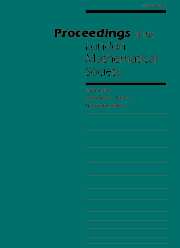Crossref Citations
This article has been cited by the following publications. This list is generated based on data provided by
Crossref.
Hurtado, A.
Markvorsen, S.
and
Palmer, V.
2009.
Torsional rigidity of submanifolds with controlled geometry.
Mathematische Annalen,
Vol. 344,
Issue. 3,
p.
511.
Markvorsen, Steen
and
Palmer, Vicente
2010.
Extrinsic Isoperimetric Analysis on Submanifolds with Curvatures Bounded from Below.
Journal of Geometric Analysis,
Vol. 20,
Issue. 2,
p.
388.
van den Berg, Michiel
2012.
Estimates for the Torsion Function and Sobolev Constants.
Potential Analysis,
Vol. 36,
Issue. 4,
p.
607.
Hurtado, Ana
Markvorsen, Steen
and
Palmer, Vicente
2012.
Comparison of Exit Moment Spectra for Extrinsic Metric Balls.
Potential Analysis,
Vol. 36,
Issue. 1,
p.
137.
Gimeno, Vicent
and
Palmer, Vicente
2013.
Volume growth of submanifolds and the Cheeger isoperimetric constant.
Proceedings of the American Mathematical Society,
Vol. 141,
Issue. 10,
p.
3639.
McDonald, Patrick
2013.
Exit Times, Moment Problems and Comparison Theorems.
Potential Analysis,
Vol. 38,
Issue. 4,
p.
1365.
Esteve, Antonio
and
Palmer, Vicente
2014.
The Chern–Osserman inequality for minimal surfaces in a Cartan–Hadamard manifold with strictly negative sectional curvatures.
Arkiv för Matematik,
Vol. 52,
Issue. 1,
p.
61.
Gimeno, Vicent
and
Palmer, Vicente
2014.
Volume Growth, Number of Ends, and the Topology of a Complete Submanifold.
The Journal of Geometric Analysis,
Vol. 24,
Issue. 3,
p.
1346.
van den Berg, M.
and
Bucur, D.
2014.
On the torsion function with Robin or Dirichlet boundary conditions.
Journal of Functional Analysis,
Vol. 266,
Issue. 3,
p.
1647.
Gimeno, Vicent
and
Markvorsen, Steen
2015.
Ends, Fundamental Tones, and Capacities of Minimal Submanifolds Via Extrinsic Comparison Theory.
Potential Analysis,
Vol. 42,
Issue. 4,
p.
749.
Hurtado, A.
Markvorsen, S.
and
Palmer, V.
2016.
Estimates of the first Dirichlet eigenvalue from exit time moment spectra.
Mathematische Annalen,
Vol. 365,
Issue. 3-4,
p.
1603.
van den Berg, M.
Ferone, V.
Nitsch, C.
and
Trombetti, C.
2016.
On Pólya’s Inequality for Torsional Rigidity and First Dirichlet Eigenvalue.
Integral Equations and Operator Theory,
Vol. 86,
Issue. 4,
p.
579.
Steinerberger, Stefan
2017.
Localization of quantum states and landscape functions.
Proceedings of the American Mathematical Society,
Vol. 145,
Issue. 7,
p.
2895.
Berg, Michiel van den
and
den Hollander, Frank
2018.
Torsional rigidity for cylinders with a Brownian fracture.
Bulletin of the London Mathematical Society,
Vol. 50,
Issue. 2,
p.
321.
Berg, M. van den
and
Kappeler, T.
2019.
On the $${ L}^{ p}$$Lp norm of the torsion function.
Ricerche di Matematica,
Vol. 68,
Issue. 2,
p.
399.
Hurtado, A.
Palmer, V.
and
Rosales, C.
2020.
Intrinsic and extrinsic comparison results for isoperimetric quotients and capacities in weighted manifolds.
Journal of Mathematical Analysis and Applications,
Vol. 492,
Issue. 2,
p.
124488.
van den Berg, M.
and
Kappeler, T.
2021.
LOCALIZATION FOR THE TORSION FUNCTION AND THE STRONG HARDY INEQUALITY.
Mathematika,
Vol. 67,
Issue. 2,
p.
514.
Gimeno, Vicent
and
Hurtado, Ana
2023.
New Trends in Geometric Analysis.
Vol. 10,
Issue. ,
p.
191.
Bañuelos, Rodrigo
Mariano, Phanuel
and
Wang, Jing
2023.
Bounds for exit times of Brownian motion and the first Dirichlet eigenvalue for the Laplacian.
Transactions of the American Mathematical Society,
Vol. 376,
Issue. 8,
p.
5409.
Shou, Laura
Wang, Wei
and
Zhang, Shiwen
2024.
Landscape approximation of the ground state eigenvalue for graphs and random hopping models.
Journal of Functional Analysis,
Vol. 286,
Issue. 7,
p.
110339.

